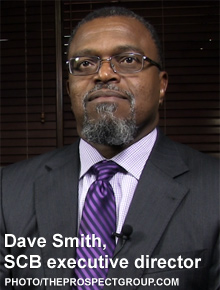| Source: Date: Updated: |
The Prospect Group
Friday, June 21, 2013 Friday, June 21, 2013 |
 What are SCB’s priorities for 2013?
What are SCB’s priorities for 2013?
SMITH: SCB’s priorities for 2013 will be focusing on the regulatory landscape, operational efficiency, and we will also be focused on people.
What major changes in regulatory landscape do you see on the horizon?
SMITH:The introduction of the Securities Industries Act (SIA) in 2011 brought a lot of changes. The act was designed with a lot of flexibility. This means we have a number of guidelines and rules that we are now in the process of implementing. This entails a process that will go on for several weeks at a time, and that will take us into 2014.
How would you describe the growth and development of financial services in The Bahamas?
SMITH: Financial services in The Bahamas has been somewhat in sync with what has been happening in the global market, particularly at the Commission, where we regulate several sectors, specifically the securities industry, and the fund services industry. What we have seen in fund services is that we have lost some value on the management side, but that was on par with the pace of the global economy.
What do you see as The Bahamas main competitive advantages with regards to financial services?
SMITH: The main competitive advantages in terms of financial services are our people. We have a vibrant work force, with a cadre of professionals from lawyers, to accountants, to strong operational personnel. That bodes well for us in terms of being able to take advantage of new business and new opportunities. That, coupled with the fact that we are a small country in close proximity to a number of key stakeholders and policy makers, means accomplishing things is only a telephone call away, as opposed to a large, extensive, bureaucratic process.
How do you see the Foreign Account Tax Compliance Act (FATCA) impacting the financial service sector?
SMITH: FATCA is quite interesting. There has been a lot of discussion about it recently. From my perspective, it is going to have an administrative burden, but that has yet to be determined, depending on which model the policy makers decide to go with. It is an issue of administrators doing all the reporting, and making sure the systems and process are in place to make that happen. That is what I see as being the most significant impact.
What are the strengths and weaknesses of the regulatory framework governing financial services?
SMITH: The flexibility of the new Securities Industry Act is a strength in terms of allowing the Commission to respond very quickly to changes in the environment, where there are product services and international demands. The way the act is designed, the Commission can make rules as opposed to going to Parliament. We have the ability to make rules and issue guidelines to respond to the needs of the industry, and ensure that it is properly regulated as it evolves. In addition, in regards to the Financial Sector Assessment Program (FSAP), we certainly have a keen understanding as to where the changes are needed. We are doing new things like revamping the Investment Funds Act to make sure it is more prudential, as opposed to being disclosure based. That again bodes well in terms of the Bahamas keeping pace with international standards and best practices.
How would you like the international business community to view The Bahamas from an investment standpoint?
SMITH: The Bahamas is open for business. We have a well-established regulatory landscape. If you put us side by side with any other international financial center, we are toe-to-toe. In December of 2012, The Securities Commission of The Bahamas achieved Signatory ‘A’ status to the IOSCO (International Organization of Securities Commissions) Multilateral Memorandum of Understanding (MMoU) Concerning Consultation, Cooperation, and the Exchange of Information. That says a lot in terms of the regulatory landscape. We are a safe place to do business. The agility of the regulator, with the enacted legislation, says that we have the ability to be responsive as a regulator. We are an independent sovereign nation with a common law structure. Our court systems are quite helpful when there are issues just as in other established nations.
Watch the interview at: The Prospect Group. More: www.scb.gov.bs.










